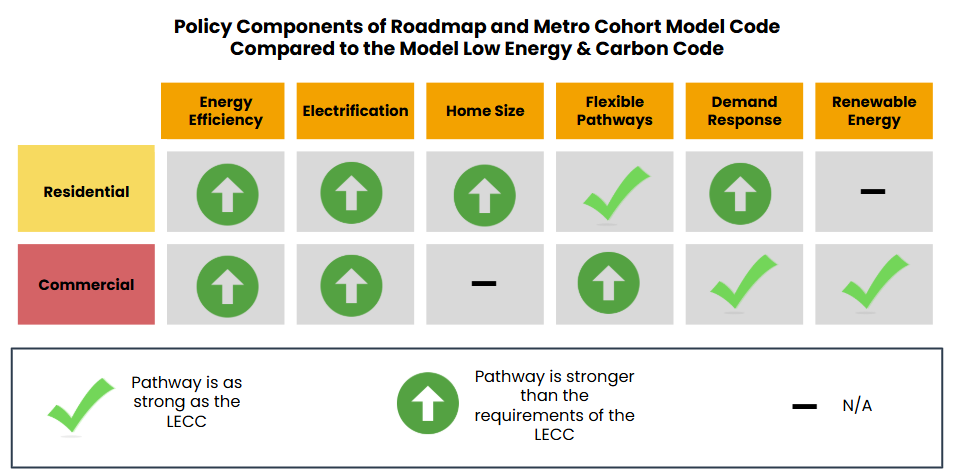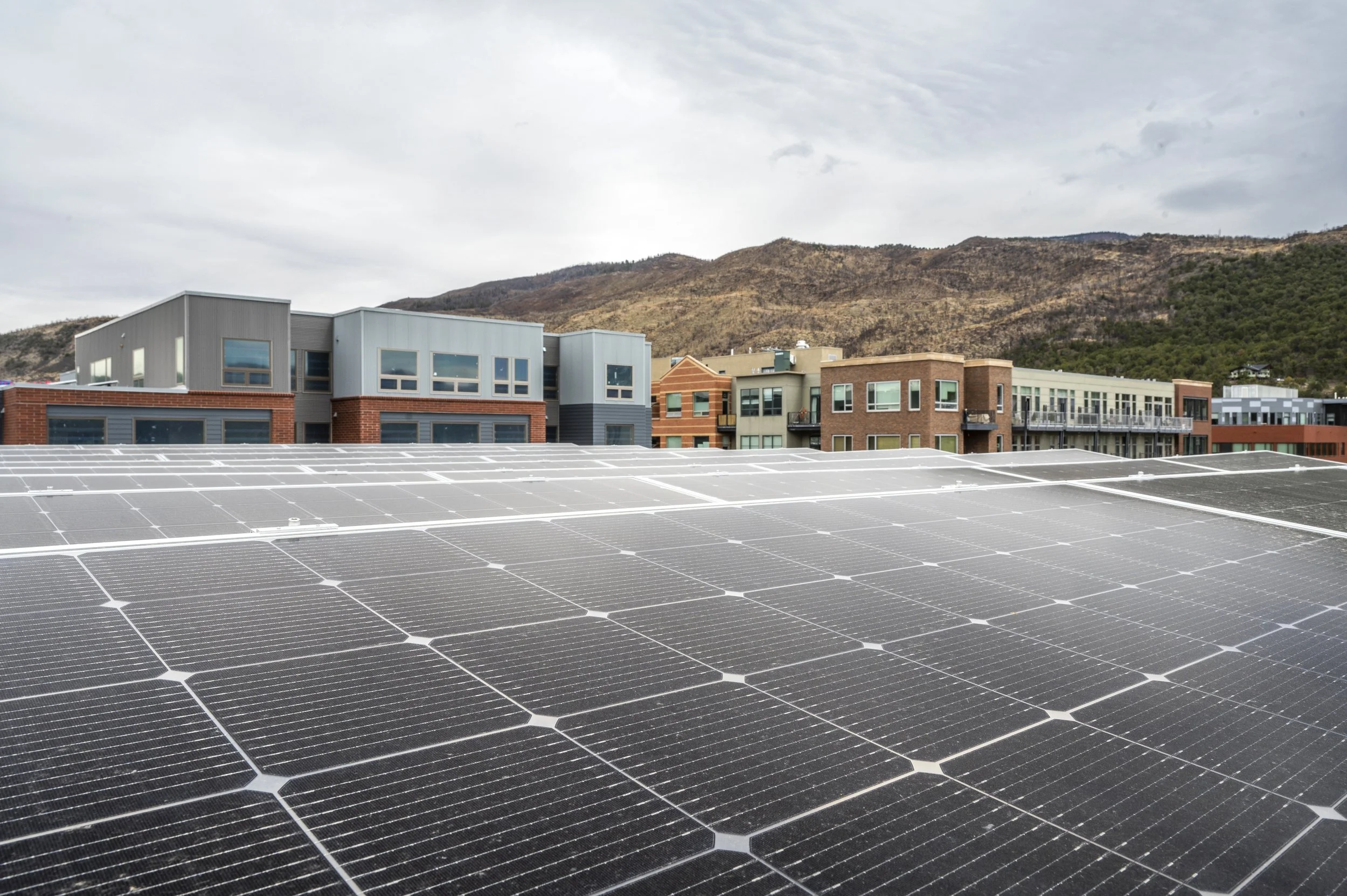Metropolitan Regional Building Policy Cohort
Roadmap to Zero Emissions New Construction and Metro Cohort Model Code
Colorado’s local governments are in a unique position to address their greatest source of carbon emissions: the built environment. In the Denver metropolitan region, buildings are responsible for 52% of regional greenhouse gas emissions and jurisdictions have set goals to reduce pollution from buildings to protect health and safety. Building energy codes in Colorado are adopted and enforced at the local level, usually based on International Energy Conservation Codes (IECC), but these are not sufficient to meet local and state goals intended to protect residents from the impacts of air pollution and climate change.
Roadmap to Zero Emissions New Construction
A Roadmap to Zero Emissions New Construction was developed in 2025 by a cohort of 15 jurisdictions in the Denver metropolitan region that recommends a phased approach to energy codes for new construction and major remodels to achieve zero emissions by 2030. By implementing these policies consistently across the region, we can standardize construction of healthy buildings that ensure no one — residents, businesses, tenants, and workforce — is left behind in the transition towards clean electric technologies.
Metro Cohort Model Code
The cohort is striving for regional consistency, and while jurisdictions are starting at various points along the pathway towards zero emissions new construction, they are increasingly converging towards all-electric or electric-preferred codes. A key point along the path is a code amendment package based on the 2024 IECC that exceeds Colorado’s Model Low Energy and Carbon Code in terms of emissions in several areas.
Additional Resources
Roadmap Appendix A: Collaborative Members and Background. Includes background on the cohort’s work in Phase 1 and Phase 2.
Roadmap Appendix B: Additional Code Elements. Includes additional policy mechanisms beyond energy codes, such as embodied carbon, waste, and water use, that jurisdictions can consider adopting.
Roadmap Fact Sheet. A three page, highly visual, executive summary of the Roadmap.
Cohort Amendment Package Fact Sheet. A two page easily digestible summary of the cohort amendments.
Metro Cohort Model Code (MCMC). Custom ICC Code, based on the 2024 International Energy Conservation Code.
Contact Info
The Roadmap and Metro Cohort Model Code are available for any community to customize and adopt. If you are interested in these or if you need access to any of the adoption support materials please get in touch with us!
Cohort Background
The cohort began in 2021 when a group of eight communities in the Denver metropolitan region convened to collaborate on adopting the 2021 IECC with supporting amendments that better prepare a building for future installations of rooftop solar, electric vehicles (EVs), electric appliances, and electric space and water heating systems. A regional code amendment package was developed and adopted by most of the eight communities with support from Lotus, the Southwest Energy Efficiency Project, and Shums Coda Associates. This work was funded by a Department of Local Affairs grant and created a framework in the state for regional collaboration on building codes which has been deployed in other areas of Colorado.
Phase 2 of the project began in 2022 with an expanded cohort of ten communities with a goal of creating a roadmap of ranked local, achievable, affordable, and equitable policies and strategies to reach the goal of net zero new construction by 2030 for the region. The roadmap was written and designed by Lotus, with support from SWEEP and Shums Coda. This roadmap laid a foundation for the Roadmap to Zero Emissions New Construction.
A Regional Roadmap for a New Net Zero: Eagle River and Roaring Fork Valleys
Redefining Net Zero and Aligning New Construction Codes in the Eagle River and Roaring Fork Valleys
Lotus provided project management and facilitation for the Eagle County Code Cohort in two phases. The first phase was focused on engaging with jurisdictions within Eagle County to align on consistent above building code amendments. The second phase, expanded our regional scope and focused on developing a region-wide Net Zero Roadmap for building decarbonization with communities within Eagle, Pitkin, and Garfield counties.
Phase 1
Phase 1 of this project included facilitation of three meetings with representatives from each Eagle County jurisdiction to create a set of above code standards, including solar-readiness, EV-readiness, and electric-readiness, that jurisdictions could adopt alongside the 2021 International Energy Conservation Code (IECC). Energy affordability, GHG reductions, and the needs of individual communities were discussed within the cohort meetings, and the consensus was reached for the recommended code package.
The scope of work included code package development along with individualized community support to help each partner community with their code adoption process. Lotus worked with consultant partners SWEEP and Mozingo Code Group throughout the project to develop the code package for the region along with supporting materials such as fact sheets, customized presentations, training materials, and other individualized support requested by each community. Lotus and the consultant team attended council meetings and study sessions with staff to ensure the code package was understood and could be adopted by each leadership council. Finally, Lotus facilitated a public engagement process for the new code package which included an informational webinar and community survey to understand community concerns and support for the new code package.
After completion of Phase 1, Lotus received positive feedback from participating local governments and the local workforce that this effort was successful and useful. This feedback inspired the regional partners to continue the collaboration to build a Roadmap to achieve net zero new construction by 2030—a shared Climate Action Plan goal of most of the Eagle County communities. Recognizing that Eagle County and neighboring communities like those in the Roaring Fork Valley share a workforce, the scope of the Cohort collaboration was expanded from Eagle County to include communities in the Roaring Fork Valley (in both Pitkin and Garfield Counties) that were interested in aligning on future energy code updates and a regional definition for net zero.
Phase 2
For Phase 2, Lotus convened a Cohort of building department and sustainability staff, sustainability and building code experts, and local utility company representatives from communities within the Roaring Fork and Eagle River Valleys through a series of collaborative meetings to develop a Net Zero New Construction Roadmap (Roadmap) for residential and commercial buildings. Lotus worked within the Cohort meetings and through individual community meetings to ensure the approaches outlined in the Roadmap met the needs of each community, and felt achievable for each staff team. The driving force for this work is to support the mountain regions in reducing and eliminating carbon emissions from new buildings to achieve climate goals, as well as strive towards a regionally-consistent building code that supports the local green building workforce as well as overall housing affordability and resiliency.
Phase 2 included the creation of a consensus-based Roadmap to net zero new construction, facilitation of key stakeholders in the region, and support of local government staff in adopting the Roadmap, which will guide the next six years of new construction code standards to achieve local climate goals. Lotus is currently working with each local government to adopt the Roadmap by resolution and apply for funding to support the ongoing implementation of the Roadmap from now until 2030.
A highlight of Phase 2 was our industry engagement. We hosted six regional Listen & Learn events with over 100 attendees that represented contractors, mechanical engineers, architects, home builders, utility representatives, energy efficiency service companies, building code officials, plan reviewers, and inspectors, and more. These sessions provided key insights that were passed along to the local government staff and presented to each council that shared a desire from the private sector to see regionally aligned building energy codes. Attendees also shared key insights into ongoing challenges for electrification and workforce availability. These insights proved invaluable during elected leadership discussions and provided elected officials confidence in their ability to adopt and implement the Roadmap in partnership with the building industry.




